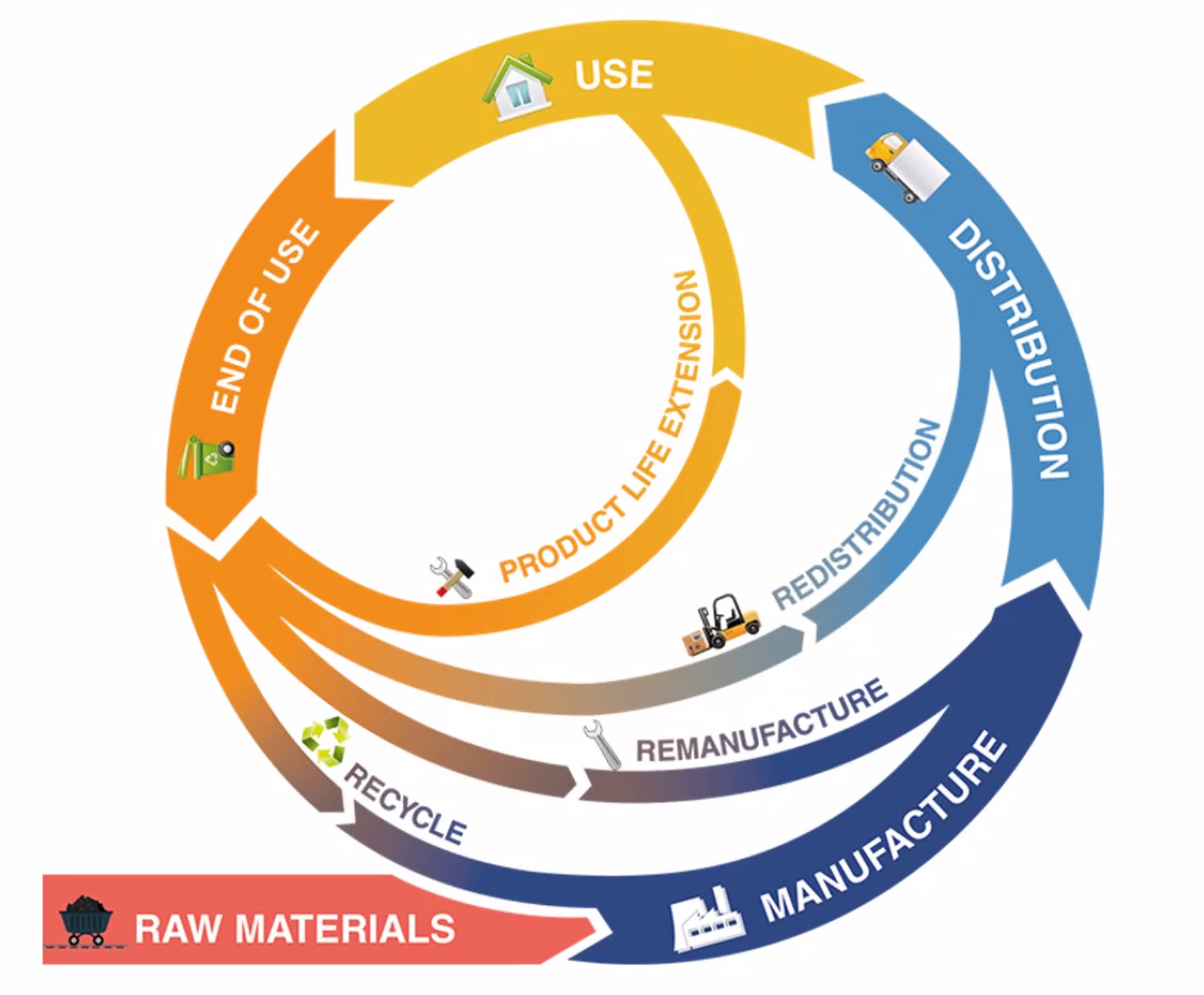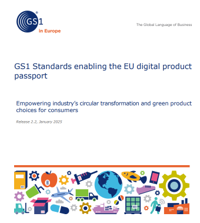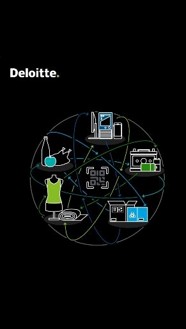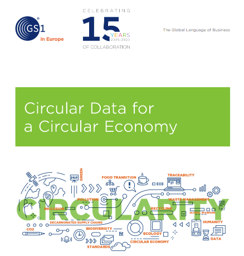GS1 Standards supporting circular economy
GS1 standards enable organisations to identify, capture and share product information smoothly, creating a common language that underpins systems and business processes all over the world. This common business language enables transparency and traceability in the supply chain allowing organisations to grow efficiently, sustainably and safely - helping transform the way we work and live in an environment of decreasing resources.
Why is GS1 engaging in circularity?
Supply chains are going through a transformation to embed greener and more transparent practices. And regulators from more areas of the world are demanding the same.
Companies across all sectors must adapt to new business processes and requirements to meet sustainability and significant circularity opportunities.
At GS1, we believe that a standardised language for data, data portability and interoperable data exchange networks are essential to the industry’s successful adaptation.

GS1 standards enabling the European Union circular economy plan
At GS1, we believe that a sustainable circular economy change at a large scale is only possible if data is structured and shared through global and open standards.
GS1 standards supporting product authentication systems are based on a collective approach, involving all actors in the supply chain setting together the rules to identify, capture and share data. Our standards are industry-driven and this is crucial as there is no real circular economy change without empowerment of the economic players who generate, use and exchange product data. The consumer will gain access to trusted product information based on more transparency and structured exchanges among all partners along the chain.
As authorities around the world start developing circular economy initiatives, GS1 stands ready to support them.
GS1 and the EU Digital Product Passport (DPP)
Among several ambitious goals and new requirements introduced by the European Green Deal, Europe’s new agenda for sustainable growth, the Ecodesign for Sustainable Products Regulation (ESPR) represents the cornerstone of the Commission’s strategy for driving more environmentally sustainable and circular product, making sustainable products the norm in the EU.
The ESPR entered into force in July 2024, and it introduces the concept of the Digital Product Passport (DPP) for products, components and intermediates products being placed on the EU market (manufactured in Europe or exported into the EU), impacting companies from all over the world, customs and cross border operations.
Several EU delegated and implementing acts are going to be issued to concretely set up the ESPR framework and introduce the DPP into sectors. The ESPR work programme confirmed the first wave of product groups that will be targeted for the Ecodesign requirements and DPP implementation which are textiles and apparel, mattresses, furniture, tyres, iron and steel, aluminium, and certain energy related products. The selection reflects a focus on sectors with high environmental impact and strong potential for circularity and sustainability improvements as highlighted in the EU Joint Research Centre study.
Relevant resources from GS1
GS1 Standards enabling the EU digital product passport – to increase understanding of GS1 standards conformant systems, GS1 is providing a White Paper explaining the different aspect of how GS1 standards, widely implemented today or planned for implementation by 2027, can support the evolving circular economy with little to no disruption to industry or consumers. The sections in the White Paper focus on Product Identification and AIDC carriers, on Facility and Economic Operator Identification, and on Data Sharing. Available here.
Public policy resources
Deloitte research study to give you some insight on the impact of international, open standards on circularity in Europe: read it here
This report was commissioned by GS1 in Europe, to impartially evaluate the regulatory context about the implementation of a Digital Product Passport, and the impacts associated with differing implementation scenarios dependent on the standards adopted.
Circular data for a circular economy
GS1 in Europe dedicated webpage “Circular Data for a Circular Economy’’ available here. This one pager is featured on the European Circular Economy Stakeholder Platform of the European Commission.
Facilitating DPPs through GS1 standards
GS1 has established a Mission Specific Working Group (MSWG), an open-to-all standardisation table, to lay the groundwork for the GS1 system to accommodate the industry's requirements for identification and data exchange in relation to Circularity/DPP. In its initial phase, the group is concentrating on tailoring the GS1 system to enable the industry to better leverage it in addressing the identified regulatory drivers of the EU Digital Product Passport (DPP).
Given the global scope of this initiative, participation is encouraged from various stakeholders including manufacturers, retailers, solution providers, regulatory authorities, and GS1 Member Organisations (MOs). To gain further insight into the group's objectives, please refer to the Call to Action and the Scorecard.
If you are interested in participating in the working group, please register here or contact gs1publicpolicy@gs1.org for more information.
Other relevant resources (EU, other stakeholders)
- Ecodesign for sustainable products regulation
- European Commission ESPR webpage
- European Commission FAQ
- ESPR Work Programme 2025-2030
- European Parliamentary Research Service - Digital product passport for the textile sector
- StandICT.eu Technical Working Group on the Digital Product Passport (DPP) - A Landscape of Standards for the Digital Product Passport
Public Policy Resources
Relevant resources from GS1
GS1 Standards enabling the EU digital product passport – to increase understanding of GS1 standards conformant systems, GS1 is providing a White Paper explaining the different aspect of how GS1 standards, widely implemented today or planned for implementation by 2027, can support the evolving circular economy with little to no disruption to industry or consumers. The sections in the White Paper focus on Product Identification and AIDC carriers, on Facility and Economic Operator Identification, and on Data Sharing. Available here.
Public policy resources
Deloitte research study to give you some insight on the impact of international, open standards on circularity in Europe: read it here
This report was commissioned by GS1 in Europe, to impartially evaluate the regulatory context about the implementation of a Digital Product Passport, and the impacts associated with differing implementation scenarios dependent on the standards adopted.
Circular data for a circular economy
GS1 in Europe dedicated webpage “Circular Data for a Circular Economy’’ available here. This one pager is featured on the European Circular Economy Stakeholder Platform of the European Commission.
GS1 Standards
Facilitating DPPs through GS1 standards
GS1 has established a Mission Specific Working Group (MSWG), an open-to-all standardisation table, to lay the groundwork for the GS1 system to accommodate the industry's requirements for identification and data exchange in relation to Circularity/DPP. In its initial phase, the group is concentrating on tailoring the GS1 system to enable the industry to better leverage it in addressing the identified regulatory drivers of the EU Digital Product Passport (DPP).
Given the global scope of this initiative, participation is encouraged from various stakeholders including manufacturers, retailers, solution providers, regulatory authorities, and GS1 Member Organisations (MOs). To gain further insight into the group's objectives, please refer to the Call to Action and the Scorecard.
If you are interested in participating in the working group, please register here or contact gs1publicpolicy@gs1.org for more information.
Other relevant resources
Other relevant resources (EU, other stakeholders)
- Ecodesign for sustainable products regulation
- European Commission ESPR webpage
- European Commission FAQ
- ESPR Work Programme 2025-2030
- European Parliamentary Research Service - Digital product passport for the textile sector
- StandICT.eu Technical Working Group on the Digital Product Passport (DPP) - A Landscape of Standards for the Digital Product Passport












